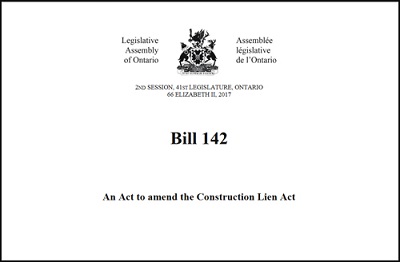 Thursday, April 25, 2024
Thursday, April 25, 2024  Thursday, April 25, 2024
Thursday, April 25, 2024 

An overhaul of construction laws has the potential to reduce the number of payment disputes and speed up the dispute resolution process, lawyers say.
During the multi-stage transition process, it will be vital that lawyers keep track of the timeline for each tweak of the massive law to avoid professional liability, says Ted Betts, head of infrastructure and construction at Gowling WLG LLP in Toronto.
After receiving royal assent in December, many major provisions of Bill 142 came into effect July 1, in the peak of summer construction season. The sweeping changes to Ontario construction laws are likely to touch almost all corners of the industry, including landlords, contractors and condo owners, lawyers say.
“You’re in a transition period and there’s a very technical definition to what projects get grandfathered [into the new Construction Act rules] and which ones don’t. If you’re cavalier about that, and you don’t advise properly, you’re exposing yourself to professional liability. It’s a very real exposure because it’s a very complicated little provision,” Betts says.
“The consequences for people on a project are very real and could be very significant.”
Click here to sign-up and receive the Weekly Round Up in your inbox every Saturday
One particularly notable change in the law, which went into effect July 1, extended the period to register a lien to 60 days from 45 days for construction projects, and it enforced more precise payment provisions surrounding lien periods, Betts says.
Some subcontractors and lenders on a project may not even know when lien rights began between an owner and a general contractor, making things even more complicated, Betts says.
“People need to pay very careful attention to which regime they are in. It will not always be crystal clear, and it could cause a very big problem for parties involved in construction projects,” says Betts, who is also chairman of the Ontario Bar Association’s construction and infrastructure law section. “There is a new lien period; it will be very important to know when a client’s lien rights expire and when they don’t. Clients — owners or contractors or subcontractors — will be looking to their counsel for advice on this, and you need to get it right.”
The changes authorized by Bill 142 are so widespread that legislators changed the name from Construction Lien Act to the Construction Act —and within the industry, the Construction Act is colloquially referred to as the “new act,” because it has shepherded the construction sector into a new world, Betts says.
The bill aimed to revamp decades-old regulations.
